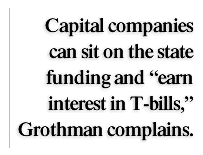Is The Legislature Giving Free Money To Fat Cat Investors?
Glenn Grothman is not a happy camper. The conservative Republican representative from West Bend is outraged by a plan to hand out $100 million to out-of-state venture capital companies to promote economic development. “At a time when we’re so broke and our budget is in such trouble, how can we afford $100 million?” Grothman asks.
 The bill has gotten bipartisan support, but Grothman calls it “sleazy” legislation that passed the assembly because some “wealthy, fast-talking people” sold legislators on it. The bill should come before the senate soon, but Grothman is still fighting it. “This cannot be the answer to economic development, just open up the state spigot, find some people and make them millionaires overnight.”
The bill has gotten bipartisan support, but Grothman calls it “sleazy” legislation that passed the assembly because some “wealthy, fast-talking people” sold legislators on it. The bill should come before the senate soon, but Grothman is still fighting it. “This cannot be the answer to economic development, just open up the state spigot, find some people and make them millionaires overnight.”
The concept behind the bill goes back to 1998, when the legislature passed a bill funneling $50 million to venture capital companies. The new bill would add another $100 million to the pot. Both bills were co-sponsored by state Sen. Gwen Moore (D-Milwaukee) and Rep. David Ward (R-Fort Atkinson), two strange bedfellows, signaling the program’s broad appeal.
Rather than directly allocating money to these capital companies, the law directs the state to “certify” capital companies that are then eligible for investments by state certified insurance companies. The insurance companies can then claim a state tax credit for investments they make in these certified capital companies. In essence, unpaid taxes from insurance companies provided the $50 million that went to three capital companies, Willshire, Banc One and First Capital.
But to Moore the law was needed because Wisconsin has a dearth of venture capital for start-up companies. Her presentation to the assembly noted that last year the venture capital industry had $225 billion under management nationally, with only $145 million, or less than 1%, in Wisconsin.
Why is Wisconsin so far behind the curve? Ward says its because Wisconsin doesn’t have its share of wealthy people, which may be true, but he offered no statistics to back this claim. Tony Hozeny, a spokesperson for the state Department of Commerce, says the problem is cultural: “We’ve had the visibility as an old-line manufacturing and agricultural state. We haven’t drawn attention to high tech in Wisconsin.”
“We had no venture capital experience in Wisconsin so we had to import it,” Ward says. Venture capital funds are a high-risk venture, he adds. “You invest in ten things and maybe seven or eight will fail. On the tenth you hit a grand slam. We need to give [companies] an incentive to take a chance.”
The 1998 law Ward helped create certainly does that. The capital companies were given $50 million, but only required to invest 30 percent of the money after three years and 50 percent after five years. As of the third quarter of 2001, these companies had made 12 investments worth just $12.8 million. “The rest could sit and earn interest in T-bills,” Grothman complains.
Hozeny says that by 2009, ten years after the money was handed out, the entire $50 million must be invested in start-up companies, but Grothman disputes this, and my reading of the law supports him. Grothman, in fact, added an amendment to the new bill (authorizing the additional $100 million) requiring the capital companies to invest 70% after seven years and 100% after ten years.
 The law, moreover, makes no requirement that the capital companies put up some of their own money, so any risks taken may only involve tax money.”You cannot lose,” says Grothman. “There is no risk. If you’re going to get state money, at least you should have to leverage that with money from out of state.”
The law, moreover, makes no requirement that the capital companies put up some of their own money, so any risks taken may only involve tax money.”You cannot lose,” says Grothman. “There is no risk. If you’re going to get state money, at least you should have to leverage that with money from out of state.”
Grothman also complains that one of the investments under this program went to a Milwaukee retailer, the House of Harley. “If there’s anything the state’s not having trouble with, it’s starting retail businesses,” he notes.
Ward defends the investment by noting the jobs it will create, but seems to concede it’s not the greatest example of venture capital investment. “Don’t judge the entire program on that one investment,” he says. Among the other investments, he notes, is ” one company west of Madison that is using milk to produce pharmaceuticals. One is producing something for the Department of Defense.”
Still, given that $37 million of the original money going to capital companies has yet to be invested, why the rush to throw another $100 million into the pot? To Grothman, who prides himself on budget frugality, it’s simply more proof that the legislature spends taxes freely.
The original law, he complains, was snuck in on the last day of the budget session. “The legislation is boring as hell and it looked like economic development, and the Finance Committee voted for it with a big majority, so I voted for it.”
But now that he’s gotten wise, Grothman says, he’s learned the law was modeled on Louisiana. “Shouldn’t that be a tip-off? Isn’t Louisiana one of the crookedest states?”
Meanwhile, the private sector has begun to generate some “angel networks” – groups that invest in high risk, start-up companies. There are now three such networks in Madison, says Hozeny, and one in Milwaukee.
The Milwaukee group, Silicon Pastures, has 47 members who pay a fee to gain access to investments deals. Managing director Jeff Rusinow says Silicon Pastures started in October 2000, and has already invested $6 million in 11 companies. That’s a much faster rate of progress than the state’s program – and without spending a cent of our taxes.
This article was originally published by Milwaukee World.
Murphy's Law
-
The Last Paycheck of Don Smiley
 Dec 17th, 2025 by Bruce Murphy
Dec 17th, 2025 by Bruce Murphy
-
Top Health Care Exec Paid $25.7 Million
 Dec 16th, 2025 by Bruce Murphy
Dec 16th, 2025 by Bruce Murphy
-
Milwaukee Mayor’s Power in Decline?
 Dec 10th, 2025 by Bruce Murphy
Dec 10th, 2025 by Bruce Murphy



















